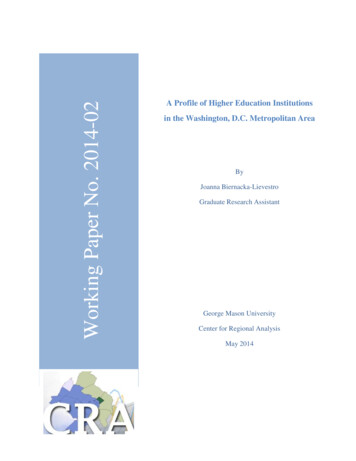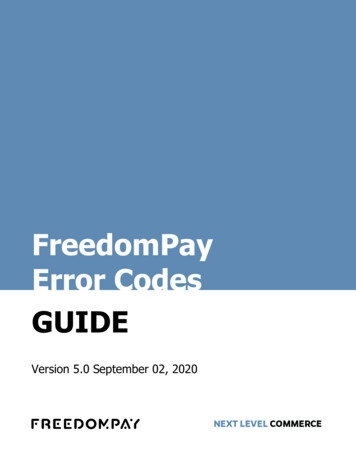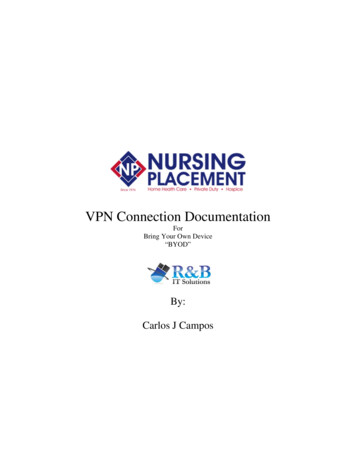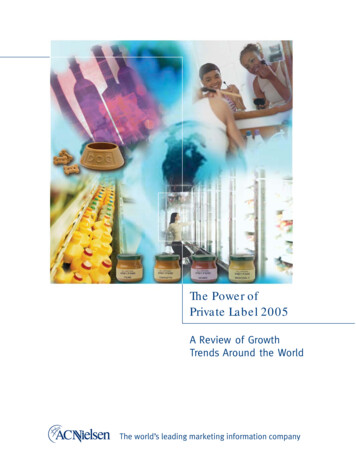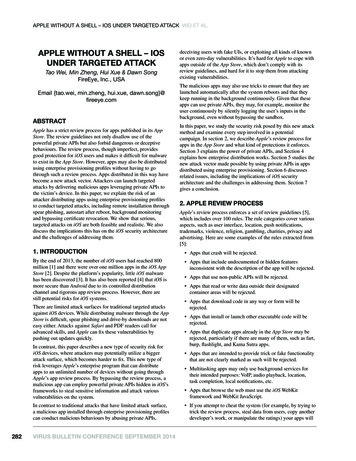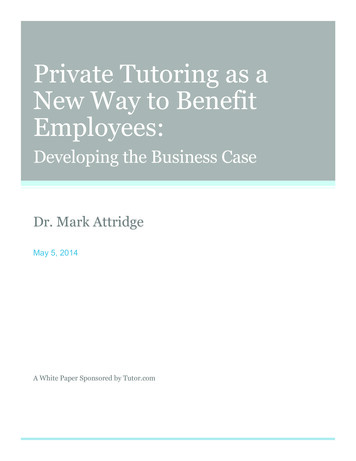
Transcription
UNETHICAL PRIVATE-EQUITY-OWNED DENTAL CLINICSRECEIVE WELL DESERVED ATTENTIONJim MoriartyMoriarty Leyendecker4203 Montrose, Suite 150Houston, TX 77006713. 528.0700moriarty.comCharles S. SiegelWaters & Kraus3219 McKinney AvenueDallas, Texas 75204214.357.6244waterskraus.comJULY 2012
UNETHICAL PRIVATE-EQUITY-OWNED DENTAL CLINICS RECEIVE WELLDESERVED ATTENTIONIt’s been a bad few weeks in the limelight for private equity investors masquerading on thedown-low as charity dentists when what they’re really after is making millions by performingunnecessary dental work on poor kids and then getting Medicaid to pay for it. With the wayeveryone’s acting, you’d think it was the mortgage crisis all over again – as if working class andpoor folk were nothing more than pawns in a game played by Wall Street investors, but financedwith American tax dollars. Outrageous! That just couldn’t happen in this country!Anyway, some private equity investors are crawling out from under their piles of money tocomplain about all the attention.1Who’s shining the spotlight?So, who’s causing such a ruckus over this alleged private-equity-owned dental crisis? Is it abunch of Huffington Post liberals out in California, taking a break from driving their electric carsthrough the fence at the Mexican border? Au contraire. First, it’s the Republican politicians:Chuck Grassley, Republican Senator from Iowa;2 U.S. Representative Michael Burgess, M.D.,from Denton, Texas;3 U.S. Representative Jim Jordan of Ohio;4 U.S. Representative Trey Gowdyof South Carolina;5 and Texas State Senator Jane Nelson from Flower Mound,6 to name a few.And the conservative politicians are joined by the media, including the avowedly conservativeFox News;7 Bloomberg (not exactly Mother Jones);8 WFAA TV in Dallas, a station owned bythe same Belo Corporation outfit that publishes the conservative Dallas Morning News;9 andrecently, PBS’s Article.cfm?customel dataPageID 1502 ostid -dentists/1
What’s wrong with private-equity-owned dental clinics?For over ten years, private equity investors have had their fingers in the nation’s dentistry pie,investing in at least two dozen dental management organizations – companies that profit bypurchasing, consolidating, marketing and managing a host of dental practices in several cities orstates.11 What’s wrong with that?Private equity investorsA private equity firm is a group of well-heeled individuals or investment funds interested inpooling their wealth to invest in privately owned companies that will, over time, make theinvestors even more money. Private equity firms generally invest directly in private businessesor they conduct leveraged buy-outs of publicly traded companies, which are then delisted fromthe stock market and made private. Private equity investors commonly have the financial abilityto hold onto an investment for a long time until it has become successful enough to generate ahandsome profit when it is sold or placed back onto the stock market through an Initial PublicOffering.12The Myth of the Dental Management Service Organization (DMSO)Many equity investors have pumped a lot of cash into the very lucrative health care market,including the dental industry, by purchasing what’s known euphemistically as DentalManagement Service Organizations (DMSOs). In the last ten years, at least 25 DMSOs havebeen backed or purchased outright by private equity firms.13The Journal of the American Dentistry Association has defined a DMSO as follows: “In general,a dental MSO provides management services that support the dental services provided by adentist or his or her group practice. An MSO may provide a wide range of services-billing andcollections, scheduling and record management, negotiating with insurers, recruiting staff,leasing space, purchasing equipment, credentialing, utilization review and quality assurancereview.” According to an industry trade group, a DMSO does nothing more than shieldoverworked dentists from the “distractions of running a business,” such as administrativefunctions, human resources, sales marketing and purchasing expensive dental equipment.14In reality, however, a DMSO is just a dental clinic bought and controlled by private equityinvestors. The investors pay the dentist outright for the practice and then make the dentist anemployee, either directly or through an affiliated professional corporation. In the real aonline.org/advantages.aspx2
dystopia of “2001: A Dental Odyssey,” the DMSO plays the role of HAL, the computer that wascreated to serve, but in fact ends up running the joint.Private-equity-owned dental clinics exist solely for investors’ profitA private-equity-owned dental clinic is owned by investors, not by dentists. These investorsdon’t care about dentistry unless it’s making them money. Their other investments are in outfitsselling baby blankets,15 propane,16 auto parts,17 or steaks and hamburgers.18 It’s all the same to aprivate equity investor.People don’t generally buy things they can’t control – with the possible exception of a puppy.The same holds true for the private equity investors who own dental clinics. It only makes sensethat as owners, the investors would exert their control over the enterprise. Look at it from theinvestors’ point of view.Wealthy private equity investors need opportunities to make more money, that’s a given. Butyou have to spend money to make money. To purchase an existing chain of dental clinics, agroup of private equity investors may spend, for example, ten times the chain’s pretax income,19which could be hundreds of millions of dollars. To grow that already large business further, sothat ultimately, it can be sold at a profit to generate future revenue for the investors, a loan maybe taken out to acquire more practices for the chain. Servicing the loan, however, will requirethe dental practices to bring in additional revenue.Since the private equity investors own the business, they are the ones making the bottom-linedecisions about how to generate the necessary additional cash. It’s their money, after all. So,how do they do it? The same way as with their other investments – sell more propane, ormufflers or steak dinners, of course. If you’ve invested in dentists, have them sell more dentalwork!Private-equity-owned dental clinics force dentists to put investors’ financialinterests over patients’ interestsAnd there’s the problem. If someone sells us a baby blanket or some fries with a cheeseburgerthat we didn’t really need, the consequences aren’t that serious and we could probably havejudged for ourselves whether to buy it or not. This isn’t so for dental services. We rely ://www.ferrellgas.com/Resource w.ta.com/investments/port detail.asp?sector 9This is the amount the private equity investors at Church Street paid for the troubled SmallSmiles Centers still under investigation. 63
dentists to make important judgments for us about the health care we need. We should be able totrust that their advice is not tainted by self-interest.The private equity investors’ solution for how to squeeze more money from a dental practice isin stark conflict with nearly universal laws, rules and ethical principles governing the practice ofdentistry. As explained by the American College of Dentists, dentists are respected members ofa learned profession. A dentist’s “chief motive [is] to benefit mankind, with the dentist’sfinancial rewards secondary.”20 “[T]he level of financial gain to the dentist must never be aconsideration in any of the dentist’s professional recommendations.”21 Because healthcareprofessionals owe this duty to recommend and provide medical treatment only when it serves thebest interests of the patient, we trust our lives to them, and the lives of our children.This is why it is illegal for a non-dentist to own a dental practice in most states, includingTexas.22 It’s why dentists in Texas and elsewhere are prohibited from entering into anyarrangement in which their professional judgment might be interfered with or influenced.23 It’swhy private-equity-owned dental clinics are a bad idea.Private-equity-owned dental clinics prevent dentists from exercising their bestprofessional judgment by tying employee compensation to company profitsPrivate-equity-owned dental clinics create an inevitable and irreconcilable conflict between adentist’s duty to make sound medical judgments based solely on the needs of the patient and thepressure to perform more dental work in service of the boss’s financial agenda. The conflict hasled U.S. senators and representatives as well as officials in at least six states to investigate, just tomake sure someone’s minding the store.24 What they’ve uncovered are allegations that manyprivate-equity-owned dental clinics emphasize quantity of care over quality of care. After all,Medicaid reimburses based on the number of procedures performed. The sales practicesdescribed in some private-equity-owned dental clinics sound more like what you’d expect fromthe car dealer than your child’s dentist.Some clinics establish quotas requiring their dentist-employees to perform a given number ofprocedures each day, or to bill a minimum of, for example, 5,000 each day.25 Often, the quotasare not established by a practicing dentist. The general production minimums are set back at the20Ethics Handbook for Dentists, American College of d.22http://www.tsbde.state.tx.us/index.php?option com content&task view&id 61&Itemid 72;In re OCA Inc., 552 F.3d 413, 422-23 (5th Cir. 2008).23Texas State Board of Dental Examiners, Rules & Regulations §108.70 (b)(1)-(15)(ImproperInfluence on Professional es160240658.html4
chain’s corporate office and then enforced by the office manager, who is generally not a dentist.Adjustments to the targets are made at the individual branches. On a day when fewer patientsare scheduled, for instance, the per-patient target goals will go up; when more patients are seen,the sheer volume will reduce the pressure to sell additional procedures. In private-equity-owneddental clinics, all of this is discussed in weekly or even daily office-wide meetings, run by officemanagers. The bean counters announce the day’s target goals, ask dentists to explain why theprevious day’s quotas were not met and offer refresher tips for everyone on how to persuadepatients to concede to additional dental work – that very day if possible to avoid the risk of afuture “no-show” appointment.High production bonuses are doled out to dentist-employees who exceed their target quotas.26On the other end of the spectrum, the dentists who fail to meet production quotas hear about itfrom corporate management and office supervisors, most of whom are not dentists. Lowproduction dentists – the ones who refuse to sell their patients dental work they don’t need – areconstantly compared to other “top producers.” They also receive negative performance reviewsand threats of termination for their failure to generate sufficient profits for the private equityinvestors. Dentists who don’t cave to the pressure are simply fired.Many clinics go further to strip dentists of their ability to exercise sound professional judgmentby offering production bonuses to every employee in the office. This undermines theprofessional’s control over the safe practice of dentistry in ways that are both overt and subtle.For example, a technician may be instructed by her boss – the office manager – that she shouldtake as many as 10 to 15 x-rays for each child seen in the clinic, or as many as Medicaid willreimburse. The clinic dentist, on the other hand, may request that only three x-rays per child betaken, given the fact that more are unnecessary and that the excess radiation may actually placechildren at a higher risk for cancer. But the technician receives a bonus tied directly to thenumber of x-rays she takes for each child. In this situation, the use of employee bonuses toassert control of clinic management over the professional judgment of employee-dentists ismanifest. The technician takes her marching orders – and her bonus – from the clinic managerwho signs everybody’s paycheck, not from the dentist.Some effects of the production bonus system for dental staff are more subtle. By rewardingevery clinic employee with production bonuses, clinics may find that each employee feelspressure to do whatever it takes to meet a management-established quota to prevent the entireteam from losing out. In addition, the prospect of a bonus now and then ensures that feweremployees are inclined to complain about a rigorous quota system that may require cuttingcorners on patient care and professional ethics. Whether their effects are open or disguised,production bonuses for dental clinic staff ensure that employees know who is lars-and-dentists/5
All of this pressure to produce profits rather than practice dentistry creates an unhealthy climateof paranoia for the dentists. They may rush through procedures, perform procedures they are notyet competent to do, hurriedly begin treatment before a child’s anesthetic has had time to kick in,or worse – strap a small child down to a papoose board and administer no anesthetic at all.Meanwhile, all of this focus on meeting production targets rather than practicing quality dentistryviolates laws, rules and ethical codes governing the practice of dentistry.27 In most states it’s notlegal; in no place on this world is it right.Medicaid sweetens the dealThe potential for profit from the ownership of dentistry (as opposed to the practice of dentistry)is made even sweeter by state Medicaid programs that reimburse private-equity-owned dentalclinics for low-income children’s dental care. Medicaid is a federal health program for lowincome families that is funded by the federal and state governments, and managed separately byeach state. State Medicaid workers don’t have nearly the time and resources to review claims forwork on children’s teeth that private insurers do, so it makes reimbursement a snap. Indeed,Medicaid has instilled in private-equity-owned dental clinics a deeply held devotion to helpingpoor children in need of dental work – a lot, and as much as Big Government will pay for.Indeed, some practically describe the former mere capitalists as today’s philanthropists, boastingthat the whole reason DMSOs ever came about was to help low income families find affordabledental care and that private-equity-owned dental clinics have actually “come to the rescue” ofAmerica’s poor.28 Admittedly, this bit of wholly unsupported revisionist history came from thecreator of a private equity firm investing in payday loan operations in low-incomeneighborhoods.29 (Now there’s a guy helping low-income folks one paycheck at a time. Foreternity.)But not to digress. Medicaid availability for children’s dentistry has been a tremendous boon forlow income families. More than 16 million low-income kids simply went without dental care in2009. When tooth decay – which affects almost 60 percent of children – goes untreated, theresulting pain and infections can affect their ability to learn and their health.30 It is critical thatall the nation’s children receive dental care, and Medicaid funding plays a crucial part inachieving that goal.27Texas State Board of Dental Examiners, Rules & Regulations §108.70 (b)(1)-(15)(ImproperInfluence on Professional Judgment); Ethics Handbook for Dentists, American College ofDentists. rg/projects/childrens-dental-campaign-3280606
Private-equity-owned dental clinics rush to infest low income neighborhoodsMedicaid funding has also gone a long way toward putting private-equity-owned dental clinicswithin easy geographical reach of poor children in need of dental care. Some claim that therewas a time when few dentists were conveniently located for families living in low incomeneighborhoods.31 That day is certainly long gone in urban Texas low income neighborhoods. Inone short half-mile stretch of road in Dallas, there are as many as five Medicaid dental clinics.32Not to be outdone, Houston betters that number with ten Medicaid clinics found within a mile ofeach other near Bellaire Boulevard.33Private-equity-owned dental clinics, in fact, are often in tight competition for the Medicaidbusiness. Indeed, some clinics hire dental recruiters to cruise food stamp office parking lots andoffer gift cards to low income mothers as an inducement for taking their children to dentistslooking to build their Medicaid practice; they buy lunch for patients spending long waits for anappointment in the dentist’s office to prevent the Medicaid recruits from leaving; they distributecoupons for free pizza to new customers; and pay bonuses to recruiters for bringing in theMedicaid business. And Medicaid recipients say the illegal recruiting efforts are not limited tojust one private-equity-owned dental clinic.34Private-equity-owned dental clinics scramble for Medicaid dollarsThe problem with Medicaid payments for low-income children’s dentistry is that the deal is justa little too sweet, apparently, for the ethically challenged. Like a cake that’s baked with toomuch sugar, the ethical underpinnings for the whole private equity-DMSO-Medicaid concoctionappear to be at risk for crumbling apart. Though equity investors who now view themselves assaviors for the nation’s poor children35 suggest that abuses of the system are “statisticallyinsignificant,”36 the actual evidence is anything //maps.google.com/maps?ie UTF8&q houston bellaire blvd medicaid dental clinic&fb 1&gl us&hq bellaire blvd medicaid dental clinic&hnear 0x8640b8b4488d8501:0xca0d02def365053b,Houston, TX&ei UL78T6uPG4vD0AGOwfDkBg&ved 0CLIBELYD&oi local as-dental-patients-156569555.html35Turning a profit on the backs of poor children is nothing new, but at least in Dickensian timesthe profiteers resisted describing their conduct as “coming to the rescue” of their victims. “Godbless us, every tal-Care7
Instead of addressing the inherent problems with the stranglehold private-equity-owned dentalclinics now have on Medicaid, some investors have resorted to the time honored tradition ofblaming the journalists who report the stories.37 It has even been suggested that the largely asyet-to-be-seen consequences for unethical private-equity-dentistry should be attributed to DebbieHagan, a private citizen who simply maintains a humble blog38 to catalog dental abuses of whichshe is informed.39 Rather than behave like some schoolyard bully literally calling a Kentuckygrandmother names – from the safe distance of the Internet – why not focus on shutting down theunethical “bad apples” before they kill the goose that laid the golden egg? Is the problem thatdefenders of private-equity-owned dental clinics just wouldn’t know where to start? Because therotten apples have been found festering from coast to coast.Texas In Texas, eleven dental companies statewide are suspended from receiving Medicaidfunds as a result of credible allegations of fraud in connection with Medicaidorthodontics after it was learned that Texas spends more money on braces for low incomechildren than the other 49 states combined. In addition, 31 separate state and federalinvestigations are ongoing regarding the Texas Medicaid orthodontia scandal.40It is the policy of Texas not to provide cosmetic orthodontia to Medicaid recipients.Rather, Medicaid orthodontic work is to be approved only where a case of severemalocclusion is shown to exist. A relatively few Texas orthodontists have allegedly beenbilking Medicaid by outfitting children with braces who did not need them, adjusting thebraces more often than needed and leaving the braces in place longer than necessary. Fora time, Texas had not required a dental mold to be submitted with Medicaid claims.Further, Medicaid required orthodontists to charge separately for every office visit ratherthan charging a flat fee, which billing practice led unscrupulous dental chains to leavebraces on too long and to adjust them more than necessary.41The bipartisan U.S. House of Representatives Oversight and Government ReformSubcommittee hears testimony from Texas orthodontist, Dr. Christine Ellis, who explainsthat when she complained to the Texas Dental Board that a Dallas dental chain majorityowned by a Chicago private equity firm had collected more than 10 million in Medicaidpayments from Texas for orthodontic work in 2010, she was told that the Dental Boardcould not prosecute the case because it had no authority to do more than take actionagainst the licenses of dentists, not corporations or businesses. The board claims it -From-Experience.html388
powerless to act, even though it is illegal for corporations or non-dentist venturecapitalists to practice dentistry in Texas.42Ninety percent of the reviewed claims made by dentists for nearly a half billion dollars inMedicaid payments for orthodontic treatment for low income children in Texas werefraudulent.43The Dallas dentist, Richard Malouf, who has billed over 10 million to Texas Medicaidjust for orthodontic work on low-income children, sold a majority of his interest in AllSmiles to Valor Equity Partners, a Chicago private equity group, whose Chris Roussos –a non-dentist – then ran All Smiles despite Texas law prohibiting a hedge fund frompracticing dentistry in the state. In a YouTube video, Roussos described his managementphilosophy in running a different dental management company: "We define success onhow well our practices are doing in the local markets. . . . Are they growing? Are theyprofitable? And are they exceeding the profitability as well as the growth of the localmarket?"44In a half-mile portion of South Buckner Boulevard in Dallas, five separate offices offerMedicaid orthodontia. The All Smiles private-equity-owned dental clinic is owned byValor Equity Partners in Chicago. Jefferson Dental Clinics is a private-equity-owneddental clinic owned by hedge fund Black Canyon Capital of California.45 And NavarroOrthodontix has a dozen offices across Texas, and collects as much in Medicaidpayments for orthodontics as anyone in the entire country – 22 million in 2010.46Though Texas Medicaid will not reimburse for braces on children younger than 12-yearsold in the absence of special exceptions personally reviewed by the state dental director,nearly 19,000 kids under 12 received Medicaid braces in 2011– 24 percent of all childrenwho received Medicaid braces.47The Texas Medicaid program is also being bilked for unnecessary steel crowns for lowincome children. Clinica Hispana, a storefront dental clinic in Houston, installed at leastnine stainless steel crowns on the teeth of every Medicaid child who received crownsthere in 2011, for a cost to the taxpayers of 337,000. The same year, children whoreceived crowns at Rodeo Dental in Fort Worth were fitted with an average of eightcrowns each, for a total billed to Medicaid of 1,004,000. Still in 2011, Bear CreekDental, with seven clinics in North Texas, received over 3.5 million from Medicaid icaidbraces-124166474.html9
steel crowns. And the Dallas private-equity-owned dental clinic All Smiles, now inbankruptcy, collected 1.6 million, again just for steel crowns and only for 2011.48Arizona Big Smiles dentists brought in by ReachOut Healthcare America, a private-equity-owneddental clinic backed by Morgan Stanley Private Equity, travel in mobile clinics toArizona schools, where they are alleged to strap children down forcibly and perform rootcanals on baby teeth and unnecessarily crown baby teeth with stainless steel caps, whenno dental treatment was warranted in the first place.49 In Camp Verde, four year oldIsaac Gagnon, who experiences seizures from a brain injury in infancy, was treated by atraveling dentist without his parents’ permission and received two stainless steel crowns,two root canals on baby teeth (pulpotomies) and ten X-rays – more than necessary andenough to present a health risk for an increased risk of cancer.The boy’s parents, both school teachers, have filed suit against the private-equity-owneddental clinic for performing unnecessary dental work and for traumatizing their alreadyfragile young boy.50California A nine-year-old boy in San Diego had four teeth pulled – allegedly without his mother’sconsent – by the Big Smiles Mobile Dental clinic, run by the private-equity-owned dentalclinic ReachOut Healthcare America, which is in turn a private equity investment ofMorgan Stanley. A traveling dentist extracted the four teeth in one of the school’s emptyclassrooms, not in the nurse’s office or a designated sterile room. The school suggestedthat if so many school nurses had not been let go due to budget cutbacks, a nurse couldhave overseen the Big Smiles' operation to ensure that the necessary authorization formshad been completed.51Maryland Church Street Health Management LLC is a Nashville private-equity-owned dental clinicthat manages 63 dental clinics in 21 states under the Small Smiles, Wild Smiles andTexas Smiles brands. In January 2010, the chain of private-equity-owned dental clinicsagreed to a 24 million settlement with the U.S. Justice Department concerning chargesthat the chain billed Medicaid for unnecessary procedures, including subjecting 10
to pulpotomies (root canals on baby teeth) between 2006 and 2010, a time during whichthe chain had been owned by a private equity firm. As part of the settlement, ChurchStreet entered into a corporate integrity agreement, which the outfit has reportedlybreached time and again, at a cost so far of 230,000 in fines. The chain has yet to makepromised improvements, however, and according to its own independent auditor, ChurchStreet has allegedly continued to bill Medicaid for services not performed,inappropriately restrain children in the midst of dental treatment, fail to give sufficientanesthesia during painful procedures, do too many procedures in one sitting, and performunnecessary procedures, all at a Small Smiles clinic in Manassas, Virginia. After theprivate-equity-owned dental chain filed for bankruptcy in February of this year and inview of the company’s flagrant violations, the Inspector General’s office with the Healthand Human Services Department threatened to exclude Church Street from receivingfurther Medicaid payments. So as not to disrupt patient services, however, Church Streetwas given another chance to correct its conduct. But when a site report was issued thisMay on the company’s Oxon Hill dental clinic in Maryland, once again officialsallegedly found the improper restraint of children, unnecessary root canals and toothextractions and inadequate procedures governing the administration of anesthesia. InNew York, Church Street closed its clinics, paid at least part of the 2.3 million owedunder the 2010 settlement, and left the state, which had imposed serious anti-fraudreviews of Church Street’s re
dystopia of "2001: A Dental Odyssey," the DMSO plays the role of HAL, the computer that was created to serve, but in fact ends up running the joint. Private-equity-owned dental clinics exist solely for investors' profit A private-equity-owned dental clinic is owned by investors, not by dentists. These investors



